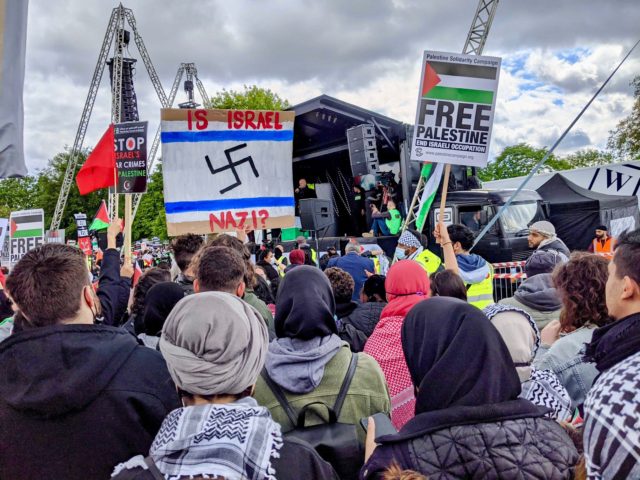The rise in anti-Semitic attacks in Britain is likely a result of Islamic extremism, according to a government minister.
Over the past month, amid a resurgence in violence in the Israel-Palestinian conflict, the United Kingdom has seen a rise in anti-Semitism through attacks on Jews and anti-Israel rhetoric.
Speaking to The Telegraph, Communities Secretary Robert Jenrick said: “I think there were signs of something more pernicious – of extremism and that makes my desire to root out extremism even stronger.”
“I want to ensure that councils that schools, charities, and organisations in every part of the country, understand their responsibility to tackle extremism … and together, root this out.”
Mr Jenrick said he was “very concerned” by recent anti-Semitic incidents, stating: “I was horrified by the scenes of the convoy of vehicles on Finchley Road because it seemed like the people who were involved felt like they were able to act with impunity … That is not acceptable in this country.
“It also highlighted the fact that there are extremists in this country and Government needs to redouble its efforts to tackle that.”
Jenrick said that the government needs to be “alive” to the threat of Islamic extremism “because some of the themes we’ve seen in recent weeks are more than just casual anti-Semitism, or people who don’t understand what anti-Semitism is, and drift into it by accident.”
The government has reportedly tasked the official reviewer of the Prevent de-radicalisation programme, William Shawcross to study the links between radical Islamist cells and the rise in anti-Semitic incidents throughout the country.
Evidence provided to the review from the Community Security Trust (CST), which monitors anti-Semitic incidents, found that amid the resurgence of violence between Palestine and Israel, there were 116 anti-Jewish incidents in the first 11 days, alone. This is compared to just 19 incidents during the preceding eleven days.
The CST said that “anti-Semitism can be a warning sign of extremism that threatens not only Jews but the whole of society”.
Britain’s former ambassador to Saudi Arabia, Sir John Jenkins said that there are “warning signs flashing everywhere” pointing to the presence of radical Islamists in the United Kingdom.
Sir John, who spearheaded a government review of the Muslim Brotherhood network in 2015, added that there is a sense that people have become accustomed to the presence of Islamic extremism in the country but urged the government to “grasp the nettle” and combat the problem.
While the mainstream media has consistently attempted to highlight the problem of far-right extremism in Britain, last October, the director-general of MI5, Ken McCallum confirmed that the biggest terror threat in Britain continues to be from jihadists.
Over the past month, there have been a series of high-profile anti-Jewish incidents across the country, including a “religiously aggravated assault” on a Jewish rabbi outside his synagogue in Essex.
A week and a half ago, footage emerged of an Islamic activist in Britain calling upon the “Muslim armies” of the world to launch a “jihad” against the “Zionist entity” (Israel).
Government officials, including Prime Minister Boris Johnson, condemned the anti-Semitism witnessed on the streets of London when members of a pro-Palestinian motorcade were filmed shouting: “F*** the Jews”, “F*** their mothers”, “F*** their daughters”, and “Rape their daughters”.
Four men have been arrested in connection to the incident and were later alleged to be tied to another incident in Manchester, in which two cars followed a Jewish man in his car before attempting to smash his windows.
There have also been two major anti-Israel demonstrations held in London this month. Both rallies were attended by former Labour Party leader Jeremy Corbyn, who was suspended from the party over allegations of failing to tackle anti-Semitism within the left-wing party.
Follow Kurt Zindulka on Twitter here @KurtZindulka

COMMENTS
Please let us know if you're having issues with commenting.